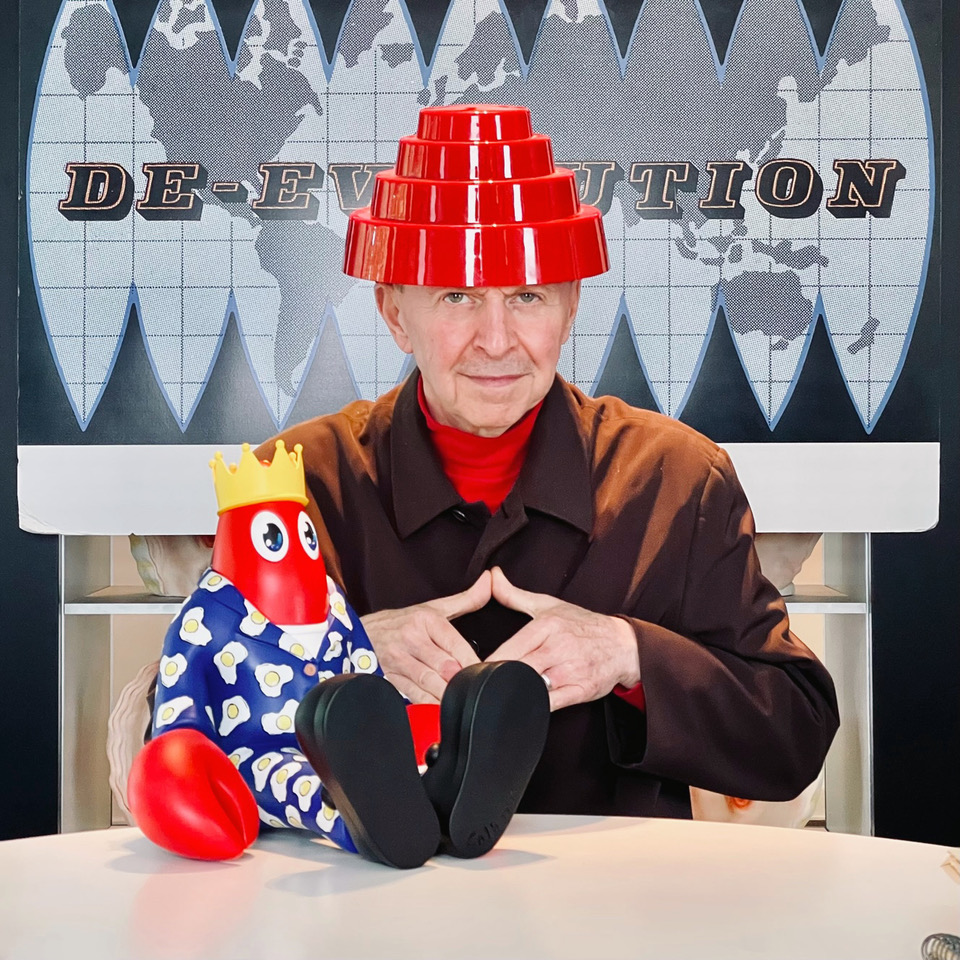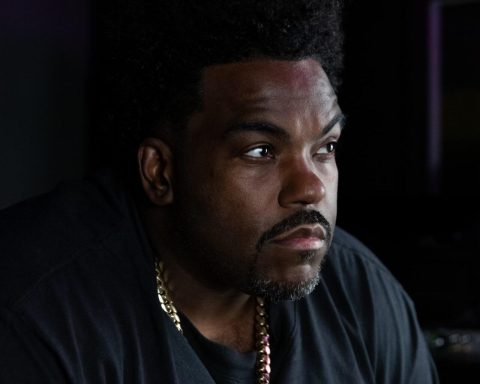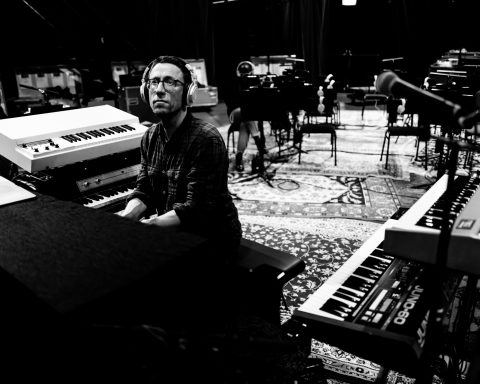Formed in 1972 by art students Gerald V. Casale and Mark Mothersbaugh, the Ohio new wave group Devo enjoyed significant commercial success in the early ’80s with their hybrid synth-rock sound. A confounded music press frequently labeled the group as nerds. Yet behind the catchy songs and self-deprecating humor lay prophetic commentary on society’s dehumanization. There was also a treasure trove of prototype Roland technologies.
Devolution Begins
Was your 1978 debut, Q: Are We Not Men? A: We Are Devo!, based on your discovery of synthesizers?
Oh no, we were using synthesizers from the very beginning. Mark played a Minimoog at our first performance as a proto-Devo band at Kent State University in 1973. We didn’t even think of ourselves as a band, but the technology kicking around at the time was making leaps and bounds.
We had some early Roland pieces before we got into sequencers. I’d consider them principally responsible for most of Devo’s body of work from the time we signed with Warner Bros. In fact, Mark’s brother, Jim, who was our tech guy and roadie, actually went to work for Roland. He was a wizard who created electronic drums before they existed by collaging a kit from remolded practice pads. You name it, we used it, including every bit of Roland gear that came out.
A Shared Vision
Did you envision electronic music being the phenomenon it became in the early ’80s?
We all shared that vision. We were fans of Giorgio Moroder and thought, “This is the future.” We liked the sounds and wanted to combine the power and aggression of rock and roll with electronics. There were no sequencers, but Alan Myers was like a human metronome anyway. After that, we started introducing songs with sequencer lines or click tracks with lots of electronics on top. Mark would use his analog synths to move the songs away from rock and roll.
"We liked the sounds and wanted to combine the power and aggression of rock and roll with electronics."
Garnering Gear and Genetic Imperative
In those days, gear was expensive. Did you have to rent the machines?
You’re right that some of the pieces were very expensive, but we used what we could. And once Jim started working for Roland, we were getting deals, buying things wholesale, and Roland would let us borrow stuff to use in the studio. We had some of the most popular pieces like the SH-101, without which we couldn’t have made our 1981 album New Traditionalists. Then we got hold of a JUPITER-6, a JUPITER-8, and the D-50, of course. There were so many it’s hard for me to enumerate them. By New Traditionalists, we wrote most of the songs on Roland sequencers, and we were using the CR-78 drum machine too.
Although synthpop had become fashionable, Devo didn’t exploit the sound’s popularity.
I suppose we were forced by genetic imperative to make our music sound a certain way. It wouldn’t have occurred to us to be as cynical as to make it sound more like Gary Numan or The Human League. We were already committed to doing things our way and loved jamming together the primitive and high-end pretension of electronica. We loved Kraftwerk, but they already had their shtick, so we knew we could never be that. They were intellectually clean: no dirt, no rock and roll, no hip shaking, and no distortion.

A Polarizing Assault
Something Devo shared with Kraftwerk is a subtle sense of humor. Did you feel that, being in the music business, you had a duty to entertain?
Devo started as performance art, even though that word was never bandied about in 1975. We were confrontational and polarizing, and that was deliberate. It was a brutal industrial assault that reacted to the state of music at the time, which had become so soporific and ridiculously produced and baroque. You had all these big stadium acts that were terrible with all their falsetto harmonies and keyboard trills. We wanted to strip all that down and be forward-thinking and conceptual with electronic music.
"We loved Kraftwerk, but they already had their shtick, so we knew we could never be that."
“Peek-A-Boo” is a standout from Oh, No! It’s Devo. What is the song about?
During my college days, I had an incredible philosophy professor who got us all going on Carl Jung and the duality of human nature. We embody the best and the worst. Everybody has their shadow or dark side and is capable of being evil. That was the impetus for “Peek-A-Boo,” with the lyrics exposing the person trying to hide behind the mask. Mark’s sequencer lines were getting scarier sounding. It was good nasty, so I started deconstructing that with everybody else in the studio.
Influence of the Roland Sound
Was Roland gear integral to the creative vision behind the songs or primarily used to supplement existing ideas?
We couldn’t have made the kinds of progressions and sounds we were pursuing without Roland gear. More than we knew at the time, Roland was absolutely sending us down a certain road and sparking ideas that would become songs. When MIDI came along, it was another revolution. I think Devo’s connection to technology is both a blessing and a curse. It uses you as much as you’re using it. I liked the digital synths, but there was something antiseptic about them. I missed the soul of analog, which had this air of dirt and a more pleasing fullness.
"More than we knew at the time, Roland was absolutely sending us down a certain road and sparking ideas that would become songs."
Do you think Roland has a sound that’s unique to its peers?
How could Roland not have a sound? Any major corporation, especially one involving tech, has a culture. Certain people gravitate to and work there and have a similar worldview or aesthetic they’re probably unaware of when doing experimentation and research. So yes, Roland probably has a Roland universe and Roland sound.
Cheerleading for the Past and the Future
Many people started throwing out their analog gear in the late ’80s, didn’t they?
They certainly did, but I was Mr. Caveman: a cheerleader for keeping a primal core. I wanted to make sure our sound had a gut punch to it. What people used to like about Devo was that we played live as if we were a machine. We were so tight it seemed impossible that we could really be doing this. People were sold on the fact that it was humans approximating the machines and not the machines telling us what to do.
"People were sold on the fact that it was humans approximating the machines and not the machines telling us what to do."
Are we likely to see a new studio album from Devo at some point?
We do make the occasional guerrilla appearance here and there. I love playing live and would play with Devo more if it were up to me, but I’ve been doing a lot of solo work and love collaboration. Last year I released the track “I’m Gonna Pay You Back” and followed that up with “The Invisible Man” this year and got to work with Martin Ware of Heaven 17 on the remix. I love Martin; we’ve stayed friends since 1981.







